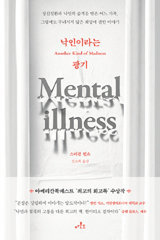Stigma is more painful for people with mental disorder
Stigma is more painful for people with mental disorder
Posted August. 13, 2022 07:26,
Updated August. 13, 2022 07:26

“Who on earth is this person?” The writer’s father, a professor at Ohio State University, was a nice guy who patiently answered all the questions from his son. However, from time to time, he became a different person. When the entire family went out for dinner, his dad complained about something to his mother-in-law with very violent language. At that moment, the writer started to question himself about “who this stranger was.”
His dad suffered from a severe mental illness called bipolar disorder. One day, when the writer was a freshman in college, his dad told him that he “sometimes wasn’t himself.” From that point, for 24 years, the writer, now a professor of Psychiatry at UC San Francisco, wrote down conversations with his dad and published a book. To share how he overcame the stigma his dad carried and his experience straightforwardly, he plainly describes the life he and his family went through because of the illness of his father.
In September 1936, the father jumped out from the 3 meters high roof. At age 16, his mind was filled with the voice, which pleaded to free Europe from the fascist movement. He attempted to fly from the roof of his family home, believing that his arms had become wings, thinking he was the hero to save the liberal world.
The battle against stigma was way more demanding than treating the illness. According to the writer, there are three types of stigmas: Perceived stigma, courtesy stigma, and self-stigma. His dad always worried about others finding out about his illness (perceived stigma) and thought he was the most useless person who was a total failure (self-stigma). His mother had to go to great lengths to present his family as a normal one. (Courtesy stigma). And the writer and his little sister had to pretend that they were normal as their mother wanted them to.
“Psychological pain, an honest conversation is very much needed,” the writer says. The surest way to win against stigma is to restore faith in humanity and embrace people different from you.
Seong-Taek Jeong neone@donga.com
Headline News
- Joint investigation headquarters asks Yoon to appear at the investigation office
- KDIC colonel: Cable ties and hoods to control NEC staff were prepared
- Results of real estate development diverged by accessibility to Gangnam
- New budget proposal reflecting Trump’s demand rejected
- Son Heung-min scores winning corner kick







